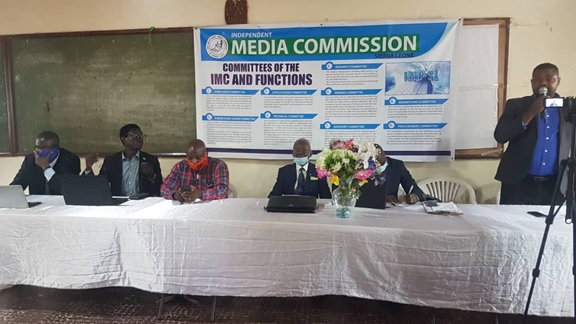By Janet A Sesay
The Independent Media Commission (IMC) yesterday organized a day’s workshop for station managers and editors from different media institutions on popularising the new IMC Act 2020. This workshop was held at the St Edwards Secondary School, Kingtom in Freetown.
In their opening remarks, Dr. Francis Sowa spoke on the purpose of the workshop by stating that, on the 23rd July 2020, history was upgraded in Sierra Leone, to the effect that the fifty-five year old legislation, that has become a serious problem to the advancement, growth and problems of journalists in Sierra Leone, was repealed, which is Part 5 of the Public Order Act of 1965.
He said that was a great achievement for journalists as media practitioners and stated that this would not have happened without the collaborative efforts of journalists across the country. He said, after the repeal on 23rd July, the IMC sat down and, on the 13th August 2020, the President signed the IMC Act of 2020 and also the repealed the Public Order Act of 2020, which gave the effect that, as on 14 August 2020, no police officer will arrest a journalist or charge the person on Criminal Libel Laws. This means that a journalist will no longer go to prison on charges of criminal and seditious libel.
He ended that, on the 18th August 2020, the document was put in the government gazette, which is a very good thing.
Donald Theo Harding, president Guild of Editors, said it was with excitement that the Guild of Editors received the news of the repeal of the Criminal Libel Law. He said that the Act was so cruel in which journalists were handcuffed, sent into trucks and taken to the Criminal Investigation Department and later sent to prison.
He said, years back, offices were being ransacked and computers taken away, but thanked the government for repealing the Act. Emmanuel Turay, representative from the Ministry of Information and Communication, said that the role and responsibility of the ministry is to respond to media issues in the country, and one of their major priorities is to repeal the Libel Act, which was the mandate and vision of the president. He said that the Ministry’s mandate is to work closely with the Independent Media Commission and also to work on the media code of practice so that journalists can sanitize their work correctly.
He said that the Ministry is also responsible to protect media issues in Sierra Leone, which are geared towards advancing good governance in Sierra Leone, which was also the mandate of the president.
He furthered that one of their policies is to enhance journalists to practice their job professionally. He added that the Ministry is also working with other media institutions, which will lead to enhancing good governance in the country.
According to him, the ‘Ministry is proud today’ that they have laid the record straight. Indeed the Public Order Act was not mandatory in Sierra Leone.
He ended his statement by calling on journalists that, in as much as the country wants freedom of expression, journalists are calling on the Ministry and government to allow them do their work in a free and conducive atmosphere. The Ministry is also appealing, through its professional bodies like the Sierra Leone Association of Journalist, Women in the Media and all media institutions, to practice in a professional manner.
The President for the Sierra Leone Association of Journalists, Ahmed Sahid Nasralla, in his statement, said that in the history of the media the new Act is a victory for media practitioners. He thanked everybody for putting their effort in making this process come to reality.
He said the role and responsibility of a journalist, especially station managers and editors, is to make sure that what is being published or broadcast is the correct information. He said that this is the time that journalists should uphold their responsibility in whatever they do, and journalists should also bear in mind that “This is our country.”
He ended that SLAJ is working closely with NASSIT and NRA to ensure that workers’ dues are being paid and that journalists also go by the IMC code of conduct.
Commissioner and chairman of IMC, George Koryama, said it was a historic moment in the life of the media in the country, as this is the death of what used to be the notorious part 5 of the Public Order Act of 1965, which had to do with criminal libel and defamation.
He said that this law was bad enough as to have had no business in the law books of this country in the first place. He said it had remained a constant threat to the freedom of the media and freedom of expression.
Commissioner George Koryama continued that, by extension, the Independent Media Commission Act 2000, including Amendments 2006 and 2007, respectively, was repealed to what has now become the Independent Media Commission Act 2020, giving the Commission more scope of independence and authority under their new mandate.
During the presentation done by Mustapha Sesay, he said that the editorial team for radio and television rely on the chief editor, managing editor and program/production manager, editor, etc.
He said that the editorial team, for newspapers, includes editor in chief, deputy editor, sub-editor, reporter and others. He said that the adherence to ethical standard of journalism is that, it is a fact that the repeal of part 5 of the Public Order Act of 1965, which criminalized libel, and the new IMC Act 2020, provides additional responsibilities on the station managers and editors.
He said that some of the key issues, in the current media code of practice, being reviewed, include accuracy, balance and credibility, copyright, opportunity to reply/retraction, privacy, harassment, children in sex and criminal cases, etc.
Other Commissioners also made their own presentations.


